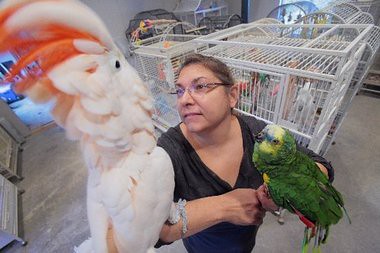 Jeanne Gilligan, who runs Helping Wing Parrot Rescue, with a Mullican Cockatoo named Boomer (left) and a blue front Amazon parrot named Rocky. Photo: Tony Kurdzuk/The Star-LedgerBLAIRSTOWN — To Jeanne Gilligan, there’s no such thing as an ordinary parrot. Each of her feathered friends — and she has more than 150 of them — has its own distinctive attributes: Some are big talkers while others tend to keep to themselves; some are sexist, they prefer being in the company of men rather than women or vice versa; and still others just like to be left alone.
Jeanne Gilligan, who runs Helping Wing Parrot Rescue, with a Mullican Cockatoo named Boomer (left) and a blue front Amazon parrot named Rocky. Photo: Tony Kurdzuk/The Star-LedgerBLAIRSTOWN — To Jeanne Gilligan, there’s no such thing as an ordinary parrot. Each of her feathered friends — and she has more than 150 of them — has its own distinctive attributes: Some are big talkers while others tend to keep to themselves; some are sexist, they prefer being in the company of men rather than women or vice versa; and still others just like to be left alone.
"They each have their own personality. Each bird is like a 5-year-old child. It’s obvious when a bird likes someone and you can also tell if a bird doesn’t like a person. It’s very obvious," said Gilligan.
Pointing to a white Moluccan cockatoo with a salmon-colored crest, Gilligan laughingly said, "And he doesn’t like me." The bird squawks as it’s being held by her neighbor Bryan Bailey, who helps Jeanne and her husband, John, run Helping Wing Parrot Rescue out of a converted garage at the Gilligans’ home on a 25-acre farm in Blairstown, Warren County.
"Parrots are way smarter than the average dog. Just because you feed them and love them doesn’t mean they’re going to love you back," said Karen Windsor, executive director of Foster Parrots Ltd., a nonprofit group that runs the New England Exotic Wildlife Sanctuary in Hope Valley, R.I.
"In fact, they may determine you to be a rival or they just may not like the way you smell or the color of your hair. They can be aggressive, territorial, extraordinarily loud and relentless in their pursuit of attention," she said.
 Toby, a blue and green macaw owned by Jeanne Gilligan of Helping Wing Parrot Rescue. Toby came from a home that had seven children and had plucked his feathers out so badly they are unlikely to grow back. Photo: Tony Kurdzuk/The Star-LedgerThe Gilligans founded Helping Wing, a nonprofit rescue and adoption center for parrots and other exotic birds, in Hopewell Junction, N.Y., in 2008 after Jeanne Gilligan lost her job as an accountant.
Toby, a blue and green macaw owned by Jeanne Gilligan of Helping Wing Parrot Rescue. Toby came from a home that had seven children and had plucked his feathers out so badly they are unlikely to grow back. Photo: Tony Kurdzuk/The Star-LedgerThe Gilligans founded Helping Wing, a nonprofit rescue and adoption center for parrots and other exotic birds, in Hopewell Junction, N.Y., in 2008 after Jeanne Gilligan lost her job as an accountant.
They moved to Blairstown in August.
Today they have about 80 parrots that are up for adoption. Some are being rehabilitated and others are older sanctuary birds. Still others are part of Gilligan’s "personal" collection of 25 parrots that she keeps in two rooms in her newly renovated home. The couple also has a smaller collection of parakeets and finches.
The parrots’ adoption price ranges from $250 to $600, depending on the size of the bird. The cost is far lower than the price of parrots sold at pet stores, which can sometimes charge up to $2,500 for a particular species, Gilligan said.
"Our price covers vetting (veterinarian care), food and housing. It barely covers the cost," Bailey said.
Most important, Gilligan wants the brightly colored birds to go to good homes, noting many came to Helping Wing as a result of people who made what she describes as "spontaneous buys" — without realizing the commitment owning one entails.
To ensure birds get good homes, Helping Wing requires prospective owners to meet the birds several times before taking one home. Adoptions as gifts for another person are prohibited.
"Parrots form strong opinions about their people. It is important not to send a parrot home with a human whom the parrot dislikes, as that adoption would be destined to fail," Windsor said. "And parrots are very opinionated."
 Bryan Bailey, a volunteer with Helping Wing Parrot Rescue, hugs an affectionate Mullican Cockatoo named Boomer. Photo: Tony Kurdzuk/The Star-LedgerProspective owners also must consent to periodic home checks by Helping Wing after the adoption, and they also have to agree to return the bird at no charge if they no longer can keep it.
Bryan Bailey, a volunteer with Helping Wing Parrot Rescue, hugs an affectionate Mullican Cockatoo named Boomer. Photo: Tony Kurdzuk/The Star-LedgerProspective owners also must consent to periodic home checks by Helping Wing after the adoption, and they also have to agree to return the bird at no charge if they no longer can keep it.
"First impressions mean a lot to me. If someone tells me they want a bird that talks — that’s not somebody I’m going to work with. They’d be getting the bird for the wrong reasons. There’s a lot more to it than that. All of the birds have an ability to talk; it’s up to them whether they want to," Gilligan said.
The interaction between the prospective owner and the bird during the pre-adoption process is key, she said.
"We like the bird to pick you."